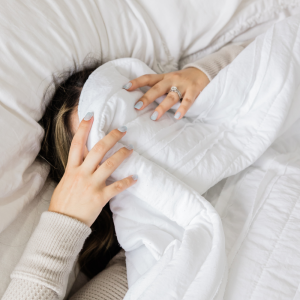Embrace Sleep during Stressful Times

Sleep disruptions – too much sleep, not enough sleep or even sleep interrupted by dreams – are more likely to occur during times of stress. As you navigate managing stress, it’s also important to prioritize sleep.
Sleep is key to your health. Just like eating nutritious food, drinking plenty of water and exercising regularly, prioritizing quality sleep is an important part of your overall wellness.
Sleep impacts your body systems, improves energy levels and reboots your brain. During quality sleep, your body relaxes and gives stress hormones a much-needed break.
“Good quality sleep can provide many benefits for us”, said Cheri Harrison, a mental health specialist at Memorial Wellness Center. “Better sleep can help reduce risk of heart disease, improve mental health, increase energy levels, reduce stress levels, help us maintain a healthy weight, improve cognitive function and help our body heal and repair itself. Prioritizing quality sleep is essential to good health.”
People require different amounts of sleep depending upon age. According to the National Sleep Foundation, as we grow older, we need fewer hours of sleep but even adults 65 and older still require seven to eight hours a night.
Want to better monitor your sleep? Keep a sleep journal for a few weeks. Many health trackers provide the number of hours of sleep, and some even report the length of time in restful sleep. If your sleep isn’t stacking up in a healthy way, consider these adjustments to enhance your sleep hygiene:
- Create a bedtime routine to start winding down around 30 minutes before going to bed. Read, listen to relaxing music, journal or take a bath.
- Reduce excess light to make your sleep environment as dark as possible.
- Establish a consistent bedtime. Go to bed and wake up around the same time daily.
- Consider reducing longer naps during your day so you are ready for sleep at bedtime.
- It’s tough but avoid time on your phone, computer or TV at least 30 minutes before going to sleep.
- Create a comfortable sleep environment. Make sure your pillow, blanket, fan, background noise apps, room temperature all support your sleep rather than disrupt it.
- Avoid caffeinated beverages late in the day.
- Be cognizant of your food and beverage choices. Eating large meals two hours prior to going to sleep can interfere with sleep.
Still experiencing sleep issues? Visit Memorial.Health for our hospitals and their Sleep Disorder Centers, which evaluate, study and support patients with persistent sleep issues.
Related Articles
Adjust Your Sleep Schedule for a Full Night’s Rest
Wake Up to the Importance of Quality Sleep